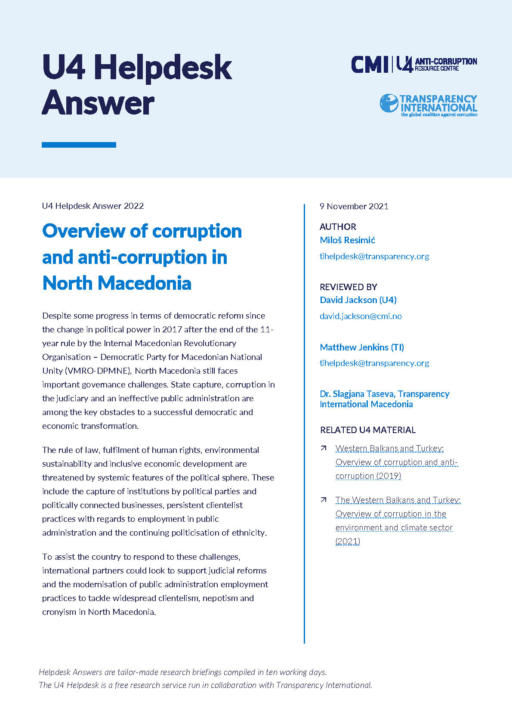
This Anti-Corruption Helpdesk brief was produced in response to a query from a U4 Partner Agency. The U4 Helpdesk is operated by Transparency International in collaboration with the U4 Anti-Corruption Resource Centre based at the Chr. Michelsen Institute.
Query
Please provide an overview of development challenges related to corruption in North Macedonia in the following areas: a) human rights, democracy, the rule of law and gender equality; b) peaceful and inclusive societies, notably inclusive reconciliation processes and conflict and violence prevention efforts; c) environmentally and climate-resilient sustainable development and the sustainable use of natural resources; d) inclusive economic development with a focus on productive employment and decent working conditions.
Summary
Despite some progress in terms of democratic reform since the change in political power in 2017 after the end of the 11- year rule by the Internal Macedonian Revolutionary Organisation – Democratic Party for Macedonian National Unity (VMRO-DPMNE), North Macedonia still faces important governance challenges. State capture, corruption in the judiciary and an ineffective public administration are among the key obstacles to a successful democratic and economic transformation.
The rule of law, fulfilment of human rights, environmental sustainability and inclusive economic development are threatened by systemic features of the political sphere. These include the capture of institutions by political parties and politically connected businesses, persistent clientelist practices with regards to employment in public administration and the continuing politicisation of ethnicity.
To assist the country to respond to these challenges, international partners could look to support judicial reforms and the modernisation of public administration employment practices to tackle widespread clientelism, nepotism and cronyism in North Macedonia.
Contents
- Background
- Extent of corruption
- Forms of corruption
- State capture
- Corruption in the judiciary
- Corruption by theme
- Human rights, democracy, rule of law, and gender equality
- Peaceful and inclusive societies
- Environmentally friendly and climate-resilient sustainable development
- Inclusive economic development
- Opportunities for international actors to support anti-corruption efforts in North Macedonia
- Legal and institutional anti-corruption framework
- Legal framework
- International conventions and initiatives
- Domestic legal anti-corruption framework
- Institutional framework
- Other stakeholders
- Media
- Civil society
- Legal framework
- References
Main points
- The key forms of corruption in North Macedonia that block its successful democratic and economic transformation are state capture and corruption in the judiciary.
- These forms of corruption facilitate organised crime, fuel citizen distrust in institutions and allow for impunity for the corrupt.
- State capture negatively affects employment practices in public administration and the environmental sector, particularly energy.
- There are opportunities for international actors to further support the reform of the judiciary and efforts to modernise public administration in North Macedonia.
Authors
Miloš Resimić, [email protected]
Reviewers
David Jackson (U4), [email protected]
Matthew Jenkins (TI), [email protected]
Dr. Slagjana Taseva, Transparency International Macedonia
Date
28/03/2022

